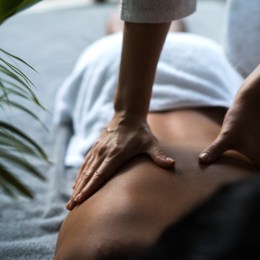It’s long been recognised that stress can make us fat. It’s not only as a result of consuming more food and drink than usual (and usually all the wrong kinds) as a stress response and getting less exercise. A sustained spike in the “anxiety” hormone cortisol makes the body store more fat, especially around the middle.
Now research suggests that stress can also make us “ugly” – making people appear less healthy to the mind’s eye, and therefore “uglier”, repelling potential partners.
British behavioural ecologist Dr Fhionna Moore looked at how mental or emotional strain can affect physical appearance and concluded that people became “significantly more attractive” to potential partners if they had lower tension levels than their rivals.
This diminished attractiveness was also blamed on cortisol, which increases the amount of glucose in body while also inhibiting muscle and bone growth.
“Cortisol is an interesting hormone because it is released when we deal with a stressor, and allows us to cope in the short term,” says Dr Moore, a lecturer in psychology at the University of Dundee, Scotland, and who has been giving public talks on Facing Up to Beauty – Is it Really Skin Deep?
“But if it’s elevated for longer periods, though, for example during more difficult times, it can be very bad for our health.”
In one study, Dr Moore measured levels of cortisol from saliva samples and took photographs of the faces of participants.
“We found that the faces of men and women who had high levels of cortisol in their saliva were rated as less attractive and healthy than those with lower levels of cortisol.
“Although we haven’t yet identified specific cues to stress in the face, it seems to come down to simply how ‘healthy’ someone looks.”
Dr Moore further claims that men who can handle stressful situations appear instantly more attractive to women.
“We believe that the link between low stress levels in men and high attractiveness to women is because an ability to handle stressful situations suggests a strong genetic makeup, the future suitability of a partner, and their ability to pass on ‘good genes’ to their children.
“Our research also showed increased attractiveness for men with consistent hormone levels.
“Low cortisol and low testosterone, or high cortisol and high testosterone, were both found to be more attractive than one level being high and the other low.”
According to Dr Moore, cortisol helps us to deal with stress by shutting down unnecessary functions, like reproduction and the immune system.
It stimulates gluconeogenesis – the making of new glucose – in the liver, using amino acids, lactate, glycerol, and propionate.
Cortisol also inhibits insulin from transporting glucose into cells, meaning it remains present in the blood stream and can in time damage blood vessels.
It also inhibits the uptake of amino acids into the muscle cells, which has a negative impact on bone and muscle growth.
As industry professionals, it’s important to be aware of a client’s stress levels and how these may be impacting on their physical and emotional health and concerns such as skin problems and stubborn weight gain, particularly around the midriff and belly.
Further, to be armed with information and advice to help educate them how stress is impacting on their physical appearance and steps to help take the pressure down for optimum results.
SPA+CLINIC approached Paradigm Switch for top tips from its directory of wellness experts.
“Our mission is to reach out and help people find optimum growth and empowerment through the potency of experiencing balanced, holistic health and wellbeing programs at home, at work or on the go,” says founder Neroli Jones.
“Paradigm Switch has compiled a data base, if you like, of talented facilitators and health professionals across diverse disciplines.
“This takes considerable discernment, which few companies or individuals have the time to research and validate.
“PS identifies leading practitioners, facilitators and coaches who are committed to delivering corporate solutions on site, either in a series of workshops or through individual one-on-one consultations. Each solution is tailored to ensure success in achieving the goals identified.”
Here PS experts share their de-stressing and stress prevention tips, for your own benefit as an industry professional and to share with your clients.
Please visit PARADIGMSWITCH.COM.AU for further information about or any bookings you may wish to make with these practitioners.

Kyla Tustin: Soul Coach and Facilitator of EXTRAordinary Change
Stress is a choice and the more you focus on it the more it will take over. We need to be willing to change our relationship to stress, to make friends with stress and see it as a motivator, rather than the enemy.
Try to choose to take your focus off stress and onto what it is you desire; focusing on creating more on states such as peacefulness and calm.
Throughout the day schedule “check in times” when you take a deep breath, ask yourself “have my thoughts, actions and choices today been of service to me?”
If the answer is yes, celebrate with another deep breath and a smile. If the answer is no, acknowledge it and then choose to flick the switch on stress by doing something differently to welcome a feeling of peace and joy.
Ninety-one percent of human behaviour is habit … shift your habits, shift your stress.

Steve Grant: Osteopathy, Acupuncture, Voice Dialogue
I spend most of my day calming and treating stressed-out mums who are trying to fit it all in.
Being the best mum, best wife, best body, best friend and best-looking are somewhat unachievable goals, but most insist on setting the standards ridiculously high, leading to stress, burn-out, and pain.
But in general I tell my clients not to let work control their lives. It’s important to be able to dedicate time in your day to switch off all electronic devices and smell the roses.
Learn to meditate, even if it’s only for 10 minutes two or three times per week. This allows you to centre the mind and to provide an inner peace that we all have, but usually can’t access.
Learn yoga. By incorporating daily yoga into your life you can allow the body to release and give the nervous system a chance to reset.

Margaret Munoz: Naturopathy, Botanic Medicine, Clinical Hypnotherapy, Advanced EFT (Emotional Freedom Techniques)
One way of diminishing stress immediately is to watch out for negative “what if” thinking, otherwise known as catastrophising, which sets off anxiety symptoms in your body as your “fight or flight response” is triggered.
Try to replace with positive, calming, resourceful and reassuring thoughts instead.
Tapping [an EFT] is an effective tool that can be done at your desk, in a matter of minutes to reduce feelings of anxiety and high pressure.

Christine Blanchard: Naturopath, Nutritionist
An ounce of prevention is worth a pound of cure when it comes to stress:
- Magnesium (300-600 mg) per day helps nourish the nervous system and herbs such as Siberian ginseng and Rhodiola increase the ability to cope with stresses.
- Fostering a daily habit of relaxation or meditation aims to prevent outbursts.
- Schedule in fun activities to balance a busy week; a bush walk, a comedy movie or family soccer in the park.
Prevention is better than cure!

Jo Kirkpatrick: Pilates, Yoga, Meditation
Tips on preventing stress from building:
- Understand what makes your soul sing and do it
- Write a gratitude list that is easily visible at work and that puts everything in perspective
- Engage in self-development work. Know your triggers for stress so you are well placed to cope in times of need
Simple exercises to control extreme pressure:
- Take three deep abdominal breaths so you are able to respond to stress rather than reacting.
- Visualise the air that you breathe in as crisp and clean. It will act to calm your emotions as you breathe it in.
- Find something to be grateful about in the present moment




